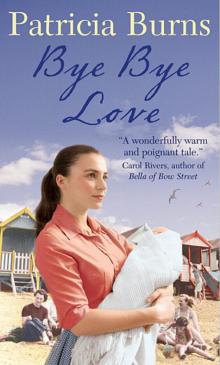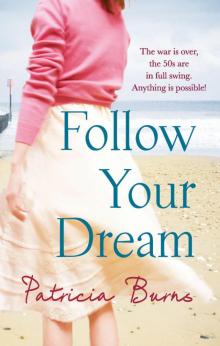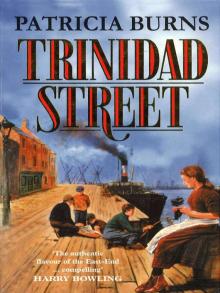- Home
- Patricia Burns
Trinidad Street
Trinidad Street Read online
Trinidad Street
Patricia Burns
Random House (1992)
Tags: Historical Saga
* * *
Synopsis
The Isle of Dogs, London at the turn of the century was a close-knit community. Here in Trinidad Street, the lives and loves of four families tangle and interweave...
When Tom Johnson, a union leader at the docks is sacked and set upon, his daughter Ellen has to leave school and her dreams of an office job. But she can still dream of Harry Turner...
But Harry, a young lighterman struggling to keep his battered family together, is bewitched by silver-tongued beauty Siobhan O'Donoghue. And Siobhan, ambitious for greater things, will use any weapon to repay the people of Trinidad Street for her disappointments.
And Gerry Billingham, if he doesn't go a deal too far in pursuit of a retail empire, will be there to pick up the pieces ...
Through good times and bad, from the coronation of Edward VII to the dock strike, some will find what they are looking for - and Ellen and Harry realise too late what they have lost.
Contents
Title Page
Dedication
Part I: 1898
Chapter 1
Chapter 2
Chapter 3
Part II: 1901–2
Chapter 1
Chapter 2
Chapter 3
Chapter 4
Chapter 5
Chapter 6
Chapter 7
Chapter 8
Chapter 9
Part III: 1905–7
Chapter 1
Chapter 2
Chapter 3
Chapter 4
Part IV: 1908–9
Chapter 1
Chapter 2
Chapter 3
Chapter 4
Chapter 5
Chapter 6
Chapter 7
Part V: 1911
Chapter 1
Chapter 2
Chapter 3
Chapter 4
Chapter 5
Chapter 6
About the Author
Copyright
Trinidad Street
Patricia Burns
To Pam and Marion,
friends extraordinary
PART I
1898
1
HALF-PAST FOUR AND a tribe of children erupted from the gates of Dock Street school. Boots clattering on the pavement, jackets and scarves and pinafores flying, they burst out into the street, girls from one entrance, boys from another, infants dragging behind big brothers and sisters. They mingled in the street outside and separated to go their various ways home through the packed terraces of Millwall. It was Friday afternoon, already dusk, and they were free of the three-storey prison for two whole days.
Ellen walked slowly, jostled by the shrieking throng, hardly noticing her young sister Daisy pulling at her arm.
‘Come on, Ellen, come on! I want to get home.’
But Ellen refused to be hurried. Her own thoughts engrossed her.
‘All right, all right,’ she said vaguely, oblivious to the urgent tugging at her sleeve.
Daisy gave up in disgust and ran on with a gang of friends. Yelling their joy at being let out, they scampered off down the street hand in hand. Ellen let her go. At eight, Daisy was quite old enough to take herself home. She thrust her hands into her pockets and frowned at the toes of her patched boots, turning over the events of the day in her mind. She did not notice the pair of boys closing in on either side of her.
‘Who’s the teacher’s pet, then?’
She started. Their faces leered at her, one sharp as a ferret, the other round and pasty. She knew just who they were. They were always in trouble for bullying. She tried to dodge round them but they danced about in front of her, grinning.
‘Toffee nose, toffee nose. Don’t want to play with us no more.’
One snatched at her tam-o’-shanter and ran off. With a yell, Ellen was after him.
‘Give it us back!’
‘Teacher’s pet.’ He threw it to his friend.
‘Give it back!’
Grinning, the thin boy backed away, holding it in the air, the wool stripes bright against the blackened brick of the high schoolyard wall.
‘Pig. Beast. Give it us!’ Ellen tried to jump up and grab it, but the fat boy held her back while his mate whirled it round and round on his finger, faster and faster. The colours became a blur. Any minute now it would fly off and land in the dirt of the cobbled street. Her beautiful new hat, the only brand-new thing she had had for ages and ages. Tears of rage gathered behind Ellen’s eyes. She kicked and struggled while the two boys laughed and taunted her.
‘Come on then, swanky, come and get it!’
‘Lovely big hat for a big head!’
She managed to kick the shins of the one who was holding her. He swore and twisted her arm behind her back. A yelp of pain escaped from Ellen, making them laugh all the more.
‘Two on to one ain’t fair.’
A taller boy strode up and calmly caught hold of the tam-o’-shanter.
‘Let go of her or I’ll fetch you one.’
The tormenters glared defiance. The big boy thrust the hat into his pocket, grabbed each of them by the collar and with one swift jerk knocked their heads together. The crack echoed loud in the raw winter air.
Ellen was released. Panting, she rubbed her arms where hard fingers had bitten into them, her heart still beating wildly. She grinned at the two sulky faces. They glared back at Ellen and her champion, who gave them a final shake and released them.
‘Now beat it,’ he told them.
For a few moments they tried to hold out, attempting to save face, but finally they backed down and turned away.
‘Blooming Trinidad Street lot,’ the thin one muttered as they both slunk off.
Interested spectators disappeared. Already the street was nearly empty of children. Gravely the big boy handed the hat back.
‘There you are, Ellen.’
Hero worship shining in her eyes, Ellen took it from his hands. Carefully she dusted the contamination of the bullies from it and pulled it back into shape, dwelling lovingly on the bright coloured stripes. Her mum had knitted this just for her, for Christmas. She arranged it over her plaits. Her head felt right now, with the hat’s woolly warmth on top.
‘Thanks, Harry. You saved my life.’
Harry Turner, blue eyes old in a youthful face, shrugged off the compliment.
‘’Snothing.’
‘If this hat’d got spoilt my mum’d go mad.’
‘Yeah, well – we got to stick together, ain’t we? Trinidad Street lot.’
‘Oh yes,’ Ellen agreed fervently. A lifetime’s loyalty bound them together. ‘What you doing up here, anyway? Shouldn’t you be at work?’
‘I’m on my way now. We’re taking a barge upriver overnight with one load and coming back down with another in the morning. I just called in here to give the kids a message.’
He started to walk up the street. Ellen tagged along.
‘Lucky for me you did.’
She wanted to keep him here. Harry was sixteen, five years older than she was, practically grown up. Once they had been friends, in a distant sort of way, for he was the brother of her best friend Florrie. But now he had a man’s job on the lighters and she was still a schoolkid. She felt undersized and gawky beside him. He had an air of strength and confidence about him rarely seen amongst the lads of her acquaintance who laboured long hours in unhealthy factories. His job on the river had built up his shoulder muscles and tanned his wide-boned face. All the girls in the street fancied him. She tried to think of something to say, something about his job. He forestalled her.
; ‘What was all that about, anyway?’
A pink blush rose in Ellen’s cheeks.
‘Oh – because I got called in to see Mr Abbot.’
‘You?’ Harry looked amazed. ‘I thought you was good at school.’
‘It wasn’t that, it was – it was about going to the Central.’
Harry whistled. ‘You going, then? Going to the Central?’
She shrugged, trying to feign unconcern, but somehow it did not work. ‘Dunno. Dunno what my mum and dad’ll say.’
Harry paused, considering. ‘They’re all right, your mum and dad.’
‘Yeah.’ Ellen smiled. ‘Yeah, they are. They’re the best.’
‘Do you want to go?’
Did she want to go? She longed to, yearned to, more than she had ever wanted anything in her short life.
‘Oh yes,’ she said, with such fervour that her whole face lit up.
Harry shook his head in disbelief. ‘Funny girl. Couldn’t wait to get out, myself. But each to his own.’
At the corner he stopped. ‘I best be getting along.’
‘Oh.’ Disappointment dragged at her. She knew very well that he would not be walking home with her, that she was just a kid of eleven, beneath his notice, but still she did not want to part.
‘Best of luck with your mum and dad.’
‘What?’
‘About the Central.’
‘Oh – yeah. Yeah, thanks, Harry. Thanks for everything.’
He brushed it off with a hunch of the shoulders and set off in the opposite direction to Trinidad Street, cap on the back of his head, a slight swagger to his walk. Her saviour. Ellen watched him until he was out of sight, swallowed up by the traffic from the factories. Then she turned for home.
Gradually her own preoccupations absorbed her again. Shaking off the fury and the triumph of the fight, she dawdled along Alpha Road, trying to decide what her mum and dad would say to the news.
Would they agree, would they be proud and say something like, ‘You always were the bright one’? Or would they say that no one in their family had gone to Millwall Central and there was no reason to start now? Or that she was to stay on at Dock Street and leave at fourteen to start paying her way in the world like everyone else – like Harry? Harry had not even considered doing anything but start work the day he was old enough. His mum had been desperate for a bit more money to come in. She couldn’t go on feeding a great boy who could be earning his own keep. A realization of her selfishness crept through the hope. There was no reason on earth why she, Ellen Johnson, should expect to be any different from anyone else, except – except – the small persistent belief that she was different. But how could she explain that to her mum and dad? They would not understand. Even worse, they might laugh.
She simply did not know how they would take it. Running over the alternatives in her head, trying to act it out, they all seemed possible. But most possible was a no of some sort.
Fear and excitement chased round her stomach, turning the emptiness of hunger into a hollow sickness.
‘Oi! Watch it, girlie!’
Ellen jumped back on to the pavement just in time. A van came sweeping round the corner into the side road just as she was stepping off. The piebald horse’s legs flashed by at a smart trot and the iron-bound wheels passed inches from her nose.
‘You all right, dearie?’ a passing woman asked.
Ellen nodded. ‘Yeah.’ Her knees felt a bit shaky. She simply hadn’t seen the thing at all.
‘Blooming van drivers – think they own the place. You look where you’re going, dear. Run you down without a second thought, they will.’
‘Yeah. Thanks,’ Ellen said.
She crossed the road with exaggerated care.
The incident shook her out of her preoccupation for fully a block of houses. She even paused to look at the knife grinder with his painted handcart, joking with the housewives as they waited with their knives and scissors to be sharpened. She watched as he pumped the foot pedal and the band made the stone wheel go round. His blackened hands held the blade, steady and sure, and with a nerve-grating sound the edge came up sharp and bright. The women paid with ha’pence or sometimes with bundles of rags, though the knife grinder grumbled and said he wasn’t a rag-and-bone man and didn’t have time to go trading all this stuff. Ellen stayed until the last knife was sharpened, watching and listening, tracing with her eyes the swirls and lines of the patterns on the cart, green and red and yellow.
‘You going to my road?’ she asked. ‘My mum’s got a knife needs doing. She said so only the other day.’
The man took a pull from the bottle of beer he had tucked down the side of the cart and wiped his mouth on the back of his hand.
‘And where might that be?’
‘Trinidad Street.’
‘Done it.’
‘Oh.’ She was disappointed. It was more fun watching your own knife being sharpened. Not as good as the rag-and-bone man – you could bargain with him – and certainly not as good as the barrel-organ man, but still fun. ‘Oh well, my mum’ll be pleased,’ she said.
The man grunted in reply, bent his stooped shoulders to grasp the handles of his cart and went trundling on.
Overhead the air was smutty with smoke from the multitude of steam engines running round the quays and warehouses of the docks. Mixed with it was the grey dust of the cement works and a reek of chemicals and oil and burning fat from dozens of factories. Ellen coughed. Like many of the Islanders she had a permanent cough, but she hardly noticed the smells. They were part of the Island, always there, like the ships’ sirens, the masts and the cranes, the trams and trains and the endless procession of horses and carts on the main roads to and from the docks. The docks dominated their lives. Behind the high walls of the warehouses to her right lay the Millwall dock. Looking down the length of Alpha Road, she could see tall masts and spars of sailing ships rearing over the chimneypots, together with the red and blue funnels of a liner. They were tied up in the West Indias. Her dad was up there, at the West Indias. When he came in, she would ask him about going to Millwall Central.
She played games, defying fate. If it’s an odd number of windows to the corner, they will let me; if it’s an even number, they won’t. Counting along the row, not letting herself cheat by looking ahead and working it out. If I can hopscotch all the way up to the shop, they’ll let me. If three McDougal’s vans pass me before I get home, they’ll let me. Twice she won. McDougal’s let her down.
She turned the corner by the Rum Puncheon into Trinidad Street. Home, her territory. She knew everyone in these houses. They might argue and squabble at times, but when it came to the push they would always stick up for each other against any outsiders. She was safe here. It wasn’t posh like Mellish Street, where the ministers and schoolteachers lived, but neither was it rough like Manilla Street, where there were fights nearly every night. It was just right.
‘’Evening, Ellen!’ An old man dragging a little trolley piled with scavenged pieces of wood raised a hand in greeting.
‘’Evening, Mr Bright! Good day?’
‘Mustn’t grumble, girl, mustn’t grumble.’
Two rows of flat-fronted two-up and two-down houses faced each other in unbroken lines across the cobbled road, the tops of their windows slightly curved, their front doors letting straight out on to the pavement. One plane tree struggled to survive just about at the point where the Irish end gave way to the English. Ellen walked past a noisy group of boys playing football, their boots skidding and clumping on the cobbles. She looked at the places belonging to her particular friends. Here was the Turners’, over there the O’Donaghues’, by the tree her big brother and Harry’s big sister, newly married, lodged with Harry’s aunty Alma. Past Granny Brown’s and Peg-leg Gibbons’ and Loony Mike’s. Last year, on the Queen’s jubilee, they had all dragged tables and chairs into the street and had a party. Smiling to herself at the memory, she pushed open the door of number thirty-two.
‘Wipe y
our feet!’ Mum’s voice boomed through from the kitchen.
Ellen carefully erased all traces of dirt from boots a size too big for her narrow feet. Inside, it was almost dark. She negotiated the black islands of the put-you-up and table and hung up the tam-o’-shanter with her coat under the stairs, touching it with grateful fingers. She hesitated. Tell her now, straight out? Or wait for later and tell both of them together? She could not decide. Light and voices came through the kitchen door. Still dithering, Ellen went in.
The black range was alight, giving out a comfortable fug. Daisy and Jack were already sitting drinking mugs of tea at one end of the scrubbed table while Mum, massive in the cramped room, was ironing at the other end.
‘You took your time. Others’ve been back ten minutes.’
‘Oh –’
‘Always in a dream. Come here.’
Ellen nestled into the warm squashy body. Mum smelt of cooking and steam and Fairy soap.
‘Been a good girl today?’
Ellen nodded against the pillow of her mother’s bosom. Now was the moment, now. She opened her mouth but only a squeak came out.
‘That’s my chick.’ Mum released her and exchanged the cooling flat-iron for the one on the range. She spat on it, was satisfied with the sizzle and thumped it down on the shirt laid out on the table. ‘Pour y’self a cup of tea, lovey.’
Ashamed of her own cowardice, Ellen lifted the heavy brown teapot with its frilly cosy of multicoloured wool, added a drop of precious milk and two spoons of sugar.
‘Mum –’
‘But why can’t I go out and play football?’ Jack interrupted.
‘You know very well why. You tore all up the back of your jacket yesterday. I got better things to do than mend your clothes every day.’
Jack, nine years old but looking younger, kicked at the table leg. His thin face with its almost colourless eyes took on a mutinous look.
‘Ain’t fair.’
Daisy and Ellen exchanged a covert grin, waiting for the explosion. Mum thumped the iron down on the range. Arms akimbo, she glared down at him.

 Packards
Packards Bye Bye Love
Bye Bye Love Follow Your Dream
Follow Your Dream Trinidad Street
Trinidad Street We'll Meet Again
We'll Meet Again